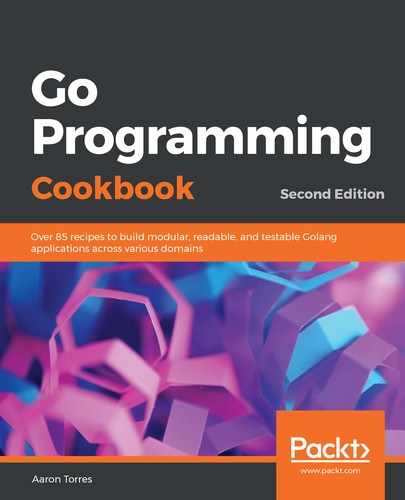The following steps cover how to write and run your application:
- From your Terminal/console application, create a new directory called ~/projects/go-programming-cookbook/chapter3/currency.
- Navigate to this directory.
- Run the following command:
$ go mod init github.com/PacktPublishing/Go-Programming-Cookbook-Second-Edition/chapter3/currency
You should see a file called go.mod that contains the following:
module github.com/PacktPublishing/Go-Programming-Cookbook-Second-Edition/chapter3/currency
- Copy tests from ~/projects/go-programming-cookbook-original/chapter3/currency or use this as an exercise to write some of your own code!
- Create a file called dollars.go with the following content:
package currency
import (
"errors"
"strconv"
"strings"
)
// ConvertStringDollarsToPennies takes a dollar amount
// as a string, that is, 1.00, 55.12,and so on and converts it
// into an int64
func ConvertStringDollarsToPennies(amount string) (int64,
error) {
// check if amount can convert to a valid float
_, err := strconv.ParseFloat(amount, 64)
if err != nil {
return 0, err
}
// split the value on "."
groups := strings.Split(amount, ".")
// if there is no . result will still be
// captured here
result := groups[0]
// base string
r := ""
// handle the data after the "."
if len(groups) == 2 {
if len(groups[1]) != 2 {
return 0, errors.New("invalid cents")
}
r = groups[1]
}
// pad with 0, this will be
// 2 0's if there was no .
for len(r) < 2 {
r += "0"
}
result += r
// convert it to an int
return strconv.ParseInt(result, 10, 64)
}
- Create a file called pennies.go with the following content:
package currency
import (
"strconv"
)
// ConvertPenniesToDollarString takes a penny amount as
// an int64 and returns a dollar string representation
func ConvertPenniesToDollarString(amount int64) string {
// parse the pennies as a base 10 int
result := strconv.FormatInt(amount, 10)
// check if negative, will set it back later
negative := false
if result[0] == '-' {
result = result[1:]
negative = true
}
// left pad with 0 if we're passed in value < 100
for len(result) < 3 {
result = "0" + result
}
length := len(result)
// add in the decimal
result = result[0:length-2] + "." + result[length-2:]
// from the negative we stored earlier!
if negative {
result = "-" + result
}
return result
}
- Create a new directory named example and navigate to it.
- Create a file called main.go with the following content:
package main
import (
"fmt"
"github.com/PacktPublishing/
Go-Programming-Cookbook-Second-Edition/
chapter3/currency"
)
func main() {
// start with our user input
// of fifteen dollars and 93 cents
userInput := "15.93"
pennies, err :=
currency.ConvertStringDollarsToPennies(userInput)
if err != nil {
panic(err)
}
fmt.Printf("User input converted to %d pennies ", pennies)
// adding 15 cents
pennies += 15
dollars := currency.ConvertPenniesToDollarString(pennies)
fmt.Printf("Added 15 cents, new values is %s dollars ",
dollars)
}
- Run go run main.go. You could also run the following:
$ go build
$ ./example
You should see the following output:
$ go run main.go
User input converted to 1593 pennies
Added 15 cents, new values is 16.08 dollars
- If you copied or wrote your own tests, go up one directory and run go test. Ensure that all tests pass.
